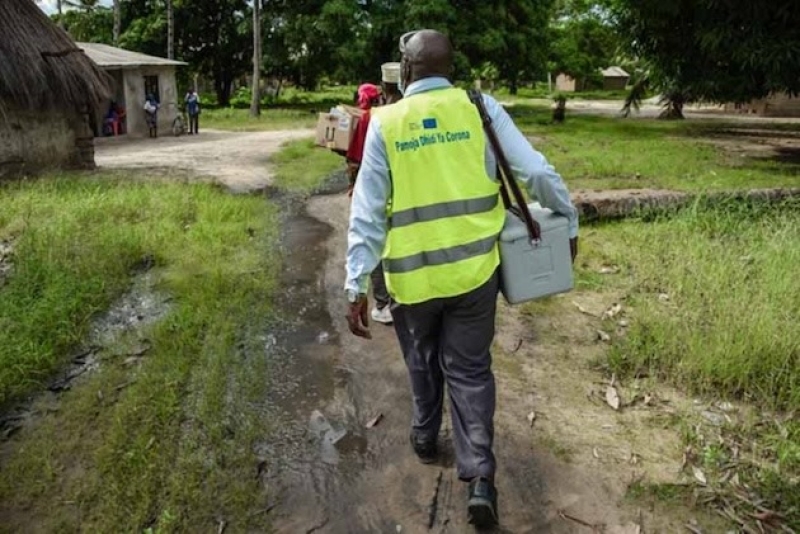- Dhaka’s air again turns ‘unhealthy’ Thursday morning |
- SC reinstates caretaker govt system in BD Constitution |
- Bangladesh can't progress sans women’s safety online & offline |
- U.S. trade deficit drops 24% in Aug as tariffs reduce imports |
Climate Action Must Protect Health, Leaders Urge at COP30

A Community Health Worker in a door-to-door campaign to vaccinate people in communities in Nanyamba village, Mtwara Region, in southeastern Tanzania.
Around the world, the climate crisis is rapidly becoming the biggest public-health threat of the century. Extreme heat now kills more Europeans than any other natural disaster. Floods in Asia displace millions and contaminate water supplies. Mosquito-borne diseases once confined to the tropics are appearing in southern Europe and the United States.
Nowhere, however, are these impacts more visible—or the responses more instructive—than in Africa, which stands at a pivotal moment in global climate discussions. Home to 17 percent of the world’s population but responsible for less than four percent of global emissions, the continent is on the frontline of a crisis it did little to cause.
Across the Horn of Africa and the Sahel, droughts, floods and heatwaves are fuelling outbreaks of malaria, cholera and dengue, while overwhelming already fragile health systems. The climate crisis is no longer a distant environmental threat; it is a daily public-health emergency.
Although the Paris Agreement acknowledged the link between climate action and health, it was COP28 in Dubai that marked a turning point. For the first time, global leaders recognised what communities across Africa have long understood: climate policy is health policy.
The UAE Declaration on Climate and Health, endorsed by more than 120 countries, affirmed that every degree of warming worsens public-health outcomes and that protecting health systems is essential for climate resilience. African negotiators were instrumental in securing this breakthrough, ensuring that health moved from the margins to the centre of climate diplomacy.
Their advocacy has laid the groundwork for the next milestone: the Belém Health Action Plan, to be launched at COP30 in Brazil. Its pillars—disease surveillance, early-warning systems, climate-smart health infrastructure and health equity—align with the Common African Position on Climate and Health, adopted in Lilongwe and reaffirmed in the Africa Group of Negotiators’ Declaration at the Africa Climate Summit in Addis Ababa.
The AGN strengthened this approach by appointing a climate and health lead coordinator, ensuring health remains a core thematic priority. Africa’s message is clear: the success of climate action must be measured by its ability to protect people’s health.
Yet global financing remains far behind. Less than one percent of adaptation funding targets health, even as climate-sensitive diseases increase. Despite pledges at COP28—including $300 million from the Global Fund and $100 million from the Rockefeller Foundation—the gap runs into the hundreds of billions. Africa alone will require roughly $300 billion annually by 2030 to build resilient systems and respond to climate-related loss and damage.
Philanthropy is beginning to respond. The newly formed Climate and Health Funders Coalition, comprising 35 institutional and individual funders, has committed an initial $300 million at COP30. But structural barriers persist.
Many existing climate funds are locked behind complex applications or delivered as loans, deepening debt burdens for already struggling economies. This is not solidarity—it is self-defeating. Pandemics, heat-related deaths and vector-borne diseases do not respect borders. A health emergency anywhere can become a threat everywhere.
COP30 offers an opportunity to change course. The Belém Health Action Plan must not become another symbolic declaration; it requires financing tied to outcomes that save lives—clinics able to operate during heatwaves and floods, vaccine cold chains powered by clean energy, and community health workers trained for shifting disease patterns.
To achieve this, global donors, multilateral banks and high-emitting nations should take three urgent steps:
Allocate a defined share of climate finance to health adaptation, making it a core performance metric.
Shift from loans to grants to prevent worsening debt crises.
Invest in African-led solutions that can be adapted worldwide, such as Nairobi’s heat-health action plans and Tanzania’s clean-cooking initiatives.
Africa’s experiences offer critical lessons. The ingenuity that kept health services functioning through droughts and pandemics is exactly what other countries will need as wildfires, shifting disease vectors and extreme heat intensify globally. The world should be scaling these innovations, not waiting for crises to reach their own borders.
Ultimately, the climate crisis has proved one fundamental truth: health security is climate security. What happens in Nairobi or Niamey resonates in New York and New Delhi. COP30 must deliver ambitious and equitable outcomes that strengthen adaptation and protect the most vulnerable. Failure to do so would ignore Africa’s realities and prolong avoidable suffering.
Leaving Belém with promises alone would be a failure of vision and justice. Leaving with funded commitments would mark a turning point—proof that the world finally understands that safeguarding health is the foundation of collective resilience and our shared future.
Desta Lakew is Amref Health Africa’s Group Director for Partnerships & External Affairs; Dr Richard Muyungi is Chair of the African Group of Negotiators on Climate Change (AGN).

